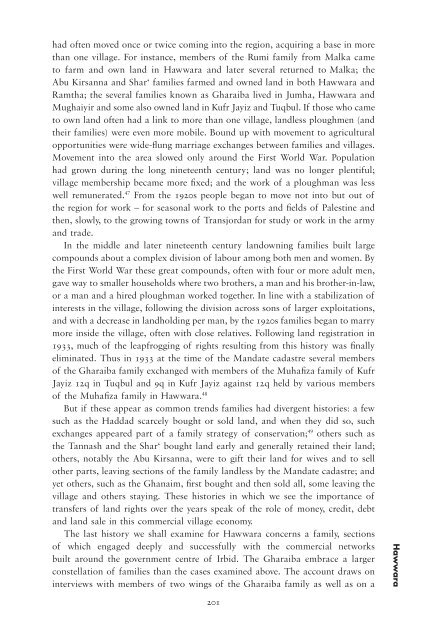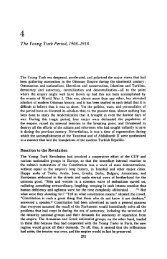Governing property, making the modern state - PSI424
Governing property, making the modern state - PSI424
Governing property, making the modern state - PSI424
You also want an ePaper? Increase the reach of your titles
YUMPU automatically turns print PDFs into web optimized ePapers that Google loves.
had often moved once or twice coming into <strong>the</strong> region, acquiring a base in more<br />
than one village. For instance, members of <strong>the</strong> Rumi family from Malka came<br />
to farm and own land in Hawwara and later several returned to Malka; <strong>the</strong><br />
Abu Kirsanna and Shar‘ families farmed and owned land in both Hawwara and<br />
Ramtha; <strong>the</strong> several families known as Gharaiba lived in Jumha, Hawwara and<br />
Mughaiyir and some also owned land in Kufr Jayiz and Tuqbul. If those who came<br />
to own land often had a link to more than one village, landless ploughmen (and<br />
<strong>the</strong>ir families) were even more mobile. Bound up with movement to agricultural<br />
opportunities were wide-flung marriage exchanges between families and villages.<br />
Movement into <strong>the</strong> area slowed only around <strong>the</strong> First World War. Population<br />
had grown during <strong>the</strong> long nineteenth century; land was no longer plentiful;<br />
village membership became more fixed; and <strong>the</strong> work of a ploughman was less<br />
well remunerated. 47 From <strong>the</strong> 1920s people began to move not into but out of<br />
<strong>the</strong> region for work – for seasonal work to <strong>the</strong> ports and fields of Palestine and<br />
<strong>the</strong>n, slowly, to <strong>the</strong> growing towns of Transjordan for study or work in <strong>the</strong> army<br />
and trade.<br />
In <strong>the</strong> middle and later nineteenth century landowning families built large<br />
compounds about a complex division of labour among both men and women. By<br />
<strong>the</strong> First World War <strong>the</strong>se great compounds, often with four or more adult men,<br />
gave way to smaller households where two bro<strong>the</strong>rs, a man and his bro<strong>the</strong>r-in-law,<br />
or a man and a hired ploughman worked toge<strong>the</strong>r. In line with a stabilization of<br />
interests in <strong>the</strong> village, following <strong>the</strong> division across sons of larger exploitations,<br />
and with a decrease in landholding per man, by <strong>the</strong> 1920s families began to marry<br />
more inside <strong>the</strong> village, often with close relatives. Following land registration in<br />
1933, much of <strong>the</strong> leapfrogging of rights resulting from this history was finally<br />
eliminated. Thus in 1933 at <strong>the</strong> time of <strong>the</strong> Mandate cadastre several members<br />
of <strong>the</strong> Gharaiba family exchanged with members of <strong>the</strong> Muhafiza family of Kufr<br />
Jayiz 12q in Tuqbul and 9q in Kufr Jayiz against 12q held by various members<br />
of <strong>the</strong> Muhafiza family in Hawwara. 48<br />
But if <strong>the</strong>se appear as common trends families had divergent histories: a few<br />
such as <strong>the</strong> Haddad scarcely bought or sold land, and when <strong>the</strong>y did so, such<br />
exchanges appeared part of a family strategy of conservation; 49 o<strong>the</strong>rs such as<br />
<strong>the</strong> Tannash and <strong>the</strong> Shar‘ bought land early and generally retained <strong>the</strong>ir land;<br />
o<strong>the</strong>rs, notably <strong>the</strong> Abu Kirsanna, were to gift <strong>the</strong>ir land for wives and to sell<br />
o<strong>the</strong>r parts, leaving sections of <strong>the</strong> family landless by <strong>the</strong> Mandate cadastre; and<br />
yet o<strong>the</strong>rs, such as <strong>the</strong> Ghanaim, first bought and <strong>the</strong>n sold all, some leaving <strong>the</strong><br />
village and o<strong>the</strong>rs staying. These histories in which we see <strong>the</strong> importance of<br />
transfers of land rights over <strong>the</strong> years speak of <strong>the</strong> role of money, credit, debt<br />
and land sale in this commercial village economy.<br />
The last history we shall examine for Hawwara concerns a family, sections<br />
of which engaged deeply and successfully with <strong>the</strong> commercial networks<br />
built around <strong>the</strong> government centre of Irbid. The Gharaiba embrace a larger<br />
constellation of families than <strong>the</strong> cases examined above. The account draws on<br />
interviews with members of two wings of <strong>the</strong> Gharaiba family as well as on a<br />
201<br />
Hawwara












